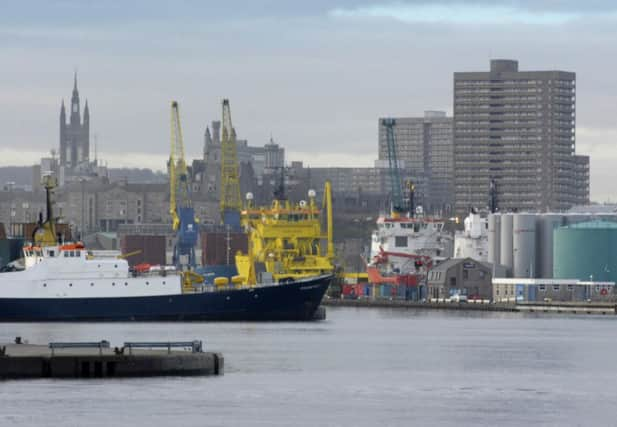Leaders: Granite City has harder foundations


Pay and employment soared and construction companies were never busier as demand kept rising for new office space and hotel accommodation.
Property prices in this micro-climate almost doubled during the past ten years. Indeed, the city’s biggest moans six months ago were due to this oil-fired success – waiting to get your boiler fixed because all the gas fitters were working offshore, the long traffic jams and the time it took to drive just a few miles out of the centre.
Advertisement
Hide AdAdvertisement
Hide AdToday, with the oil price slump, the city tells a different story. At an oil industry summit today, city council leader Jenny Laing will call on Westminster and Holyrood to agree a multi-million-pound “City Deal” similar to the additional grant funding agreed last year for Glasgow. Investment of £1.3 billion, she says, is needed to help the Granite City cope with the oil price slump and the resulting investment cancellations, retrenchment and job losses. “Ongoing austerity,” she argues, has led to Aberdeen being starved of investment in its infrastructure, despite its status as Europe’s oil capital. While the economy may have boomed over the last ten years, the lack of enabling public sector investment “is holding back investment from the private sector”.
Few doubt that the oil price collapse has hit the industry hard – and with it the £35bn supply chain. In addition, the case for lowering the North Sea supplementary tax regime is especially compelling – such is the shock to the sector that it should not be necessary for the industry to have to wait until the Budget on 18 March for an announcement.
However, whatever else may have afflicted this city, “austerity” can hardly be cited as a cause and we should beware of an impulsive demand for government money. This is a crisis brought on not by some natural disaster but by movements in the price of a highly volatile commodity. This is severe, but has it, according to one observer, brought the industry “close to collapse”? We do not have to go all the way with the view of industry veteran Sir Ian Wood that such rhetoric is “well over the top and far too dramatic”. Few believe the Brent crude price longer term is likely to stay at the current $49 a barrel level – the futures price jumping 6 per cent on Friday to $52.49. And is Aberdeen and its hinterland, accounting for almost 14 per cent of Scotland’s gross value added, not without some resilience after more than a decade of boom? What of the needs of urban areas that have enjoyed no such boom?
In any event, agreement on a City Deal for Aberdeen critically requires a sober assessment of its longer-term needs and requirements. That requires clarity on the effects of pending tax changes and an oil market rather more stable than is currently the case.
Top people should lead by example
FEW topics create greater ructions in police stations – and in offices across the land – than expenses. The individual sums involved may be petty, but it is not the niggling size of the claims that have opened Vic Emery, the £90,000-a-year chairman of the Scottish Police Authority, to criticism. He submitted expenses for attending the funerals of the officers killed in the Clutha helicopter crash.
He sought to claw back £135 for 0.3 days of his time, as well as £2.25 mileage, to go to the funeral of the helicopter pilot; claimed £540 for 1.2 days and £32 of mileage to attend a funeral on the Isle of Arran and put in a further claim for attending a third funeral before going back to his office.
The exactitude is not in dispute; such calculations of claim pale before the greater issue of appropriateness. Mr Emery is well compensated for the role he carries out, and that compensation reflects the duties of attendance he necessarily has to undertake as SPA chairman. He is not a young rank-and-file police officer struggling to make ends meet on a modest salary. In his role he should not be making a continuous calculation of the cost of every mile travelled to attend a funeral or fractional apportionments of time spent. It befits neither the office he holds nor his duties.
That he now says he is donating the expenses to the Clutha Trust testifies to subsequent reservations about the appropriateness of this claim. Hundreds of police officers willingly gave up their own time to attend the funerals and memorials for the Clutha victims and did so simply because it was the right thing to do. Such was the example the SPA chairman should himself have set.